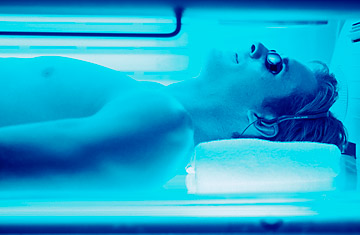
There's nothing like a golden glow to give the impression of healthy vigor, but new research shows that some people who consistently sport the toasted look may have a hazardous addiction to tanning.
In a study of 421 college undergraduates, researchers in psychiatry and psychology at Memorial Sloan-Kettering Cancer Center and the University of Albany, State University of New York, found that a subgroup of indoor tanners showed classic signs of substance-related disorder: they were hooked on their tanning-booth sessions the same way others are dependent on alcohol or drugs. The frequent tanners were also more likely to report moderate to severe symptoms of anxiety and depression than their peers who were not addicted to tanning or did not tan at all.
For their study, published on Monday in the Archives of Dermatology, Catherine Mosher, a behavioral scientist at Memorial Sloan-Kettering, and her partner worked with college students in the fall of 2006. They asked the students about their indoor-tanning habits as well as their attitudes toward tanning, using two separate measures. The surveys — which were modified versions of questionnaires that are traditionally used to screen for other substance-related disorders — included questions such as, When you wake up in the morning, do you want to use a tanning bed or booth? Have you ever missed any scheduled activity (social, occupational or recreational activities) because you decided to use tanning beds or booths? Do you ever feel guilty that you are using tanning beds or booths too much? In addition, the volunteers filled out questionnaires to assess their levels of anxiety and depression.
Slightly more than half of the students reported ever having used an indoor tanning bed, and among those, 35% on average qualified as being addicted to tanning. All of the heavy users admitted knowing they could develop skin cancer from using tanning booths, but 98% said the risk didn't prevent them from pursuing a bronzed complexion. Among those who were considered addicted to tanning, 78% reported unsuccessful attempts to cut down on indoor-tanning time, and the same percentage said they felt guilty about tanning too much.
In previous studies, frequent tanners have reported that lying in a tanning bed helps them feel more relaxed and at ease, which would explain in part why tanners compulsively go back for more, says Mosher. Other researchers postulate that it's the UV exposure from the booths that raises tanners' levels of endorphins — the brain's feel-good chemical — but not all studies have confirmed this link.
Not every expert agrees that frequent tanning rises to the level of an addiction. "If tanning results in relaxation and reduced anxiety, this behavior would tend to be repeated — similar to meditation or yoga for other people," said Dr. Thomas Weigel, a psychiatrist at Harvard Medical School and McLean Hospital, in an e-mail commenting on the study. But he acknowledged that "there is logic to the correlation between 'tanning addiction' and anxiety."
Indeed, Mosher and her partner, Sharon Danoff-Burg, analyzed the correlation between tanning frequency and anxiety and found that frequent tanners who qualified as being addicted reported twice the rate of anxiety as those who used tanning beds but were not addicted. The addicted tanners were also more likely to have used alcohol and marijuana in the previous month, suggesting a common reason underlying the use of all three: as with the use of other substances, excessive tanning sessions could be hiding a deeper mental distress. "Both tanning indoors and the use of substances are thought of as a way to regulate emotions, or cope with distressing emotions," says Mosher.
Only a minority of addicted tanners may be harboring mood disturbances, but Mosher notes that in that small group, fanatic tanning could be an early symptom of underlying anxiety. And if Mosher's findings are replicated, they may suggest that doctors should not only counsel frequent tanners about the risk of skin cancer, but also screen them for the possibility of an addiction.
To read this article in its entirety, pick up a copy of TIME magazine at your local newsstand or download the TIME iPad app. Or, to have TIME magazine delivered to your door every week, subscribe. Print subscribers to the U.S. edition of TIME can access the iPad edition FREE for the length of their current print subscription term.
